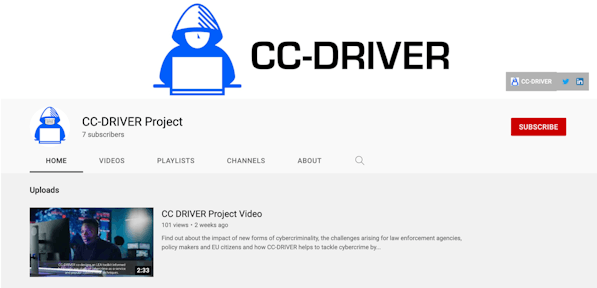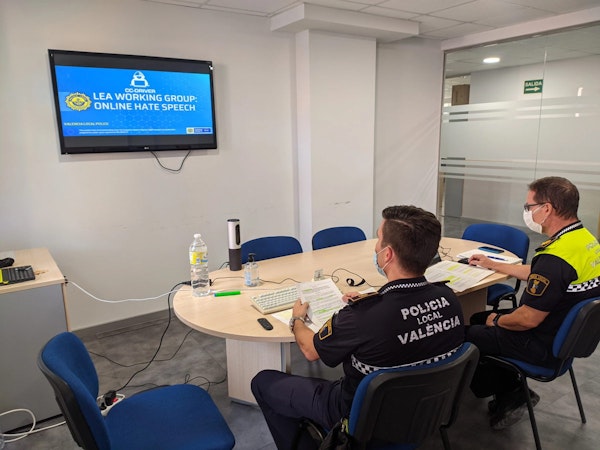New methods to prevent, investigate and mitigate cybercriminality |
|
|
View in Browser Welcome to the CC-DRIVER newsletter! CC-DRIVER is an EU-funded H2020 project combining interdisciplinary research with innovation activities to illuminate the role of technical and human factors in current cybercrime trends and translate the findings into co-design tools and new methods to support the fight against cybercrime. We welcome your insights on our research and innovation activities by contacting us at ccdriver@trilateralresearch.com. You can follow project updates on our CC-DRIVER website and by following our social media handles. |
|
|
- The CC-DRIVER project video and our new YouTube channel
- Latest project news
- Cyberbullying, an increasing global challenge
- The rise of Cybercrime-as-a-Service (CaaS)
- Recent events
- CC-DRIVER on tour
- Out now: CC-DRIVER policy briefs
- For LEAs
- LEA Working Group insight on online hate speech
- Reading corner
- A comparative analysis of cybercrime policy in eight countries
- Scoping cybercriminality and technical capabilities
- LEA Cluster news & events
- Welcome our newest cluster member - TRACE
- CC-DRIVER - RAYUELA meeting about ethics and legal challenges
|
|
|
The CC-DRIVER project video and our new Youtube channel Cybercriminality is causing enormous economic and social costs in our societies across the globe, but how can we better prevent, investigate and mitigate cybercriminal behaviours? Find out more in our CC-DRIVER project video on our website or our brand-new Youtube channel! |
|
|
Cyberbullying – an increasing global challenge Cyberbullying is the evolution of traditional bullying into the virtual and digital world and can include types of physical and/or psychological abuse, harassment, threatening and aggressive behaviours, as well as humiliation, and has a high prevalence among children and adolescents. During 2020 and 2021, the number of cyberbullying victims has increased, largely due to the COVID-19 pandemic and the lockdowns around the world, which augmented online activities. Our research – based on interviews with experts in the field – will allow for thematic analysis to identify cybercrime pathways, drivers, prevention, and intervention methods in general and also specifically for cyberbullying as it is one of the types of cybercrime to which young people are particularly susceptible. Read more Read our previous blogpost on understanding youth cybercriminality – overview of key interview findings from experts in the field. |
|
|
The rise of Cybercrime-as-a-Service (CaaS) In recent years, technological advancements like the Internet of Things (IoT) have been highly beneficial in enabling us to connect our everyday devices to the Internet, allowing digital technology to permeate every part of our lives. However, alongside its benefits, IoT poses a significant challenge by exponentially increasing the number of points in a software environment where cybercriminals can attack. This increasing attack surface leaves not only organisations and governments but also individuals exposed to serious cyber risk. The CC-DRIVER research aims to reduce cybercrime and deter young people from a life of crime. It tackles the key challenges faced by LEAs, by recognising the ever-changing nature of CaaS and by supporting LEAs to be one step ahead of cybercriminals. Read more |
|
|
CC-DRIVER on tour September was a busy month for CC-DRIVER. On 9 September, our colleagues from the University of East London presented the project at the European Society of Criminology's Eurocrime 2021. This year, the conference was themed "Criminology in a Time of Pandemic" and held online. Find here our previous blog post (Dec 2020) on cybercrime in the age of a global pandemic. On 15 September, our coordinator David Wright from Trilateral Research presented the project and its LEA Cluster at European Association for Biometrics' Research Project Conference 2021 in cooperation with the Joint Research Center (DG-JRC) of the European Commission and Fraunhofer IGD. Find here more information on our LEA Cluster. |
|
|
Out now: CC-DRIVER policy briefs |
|
|
The technical drivers of cybercrime |
| Review and gap analysis of cybersecurity legislation and cybercriminality policies in eight countries |
|
|
Over the past few years, we have witnessed a significant increase in cybercriminal activities. How should the EU respond to these attacks? Past policy interventions have demonstrated that strong policy decisions may help to improve the security and privacy of EU citizens in cyberspace. Moreover, inaction may lead to even worse outcomes. To make matters worse, as cyberspace continues to evolve, cybercriminals will be given a leveled landscape and a clear head start. Some options for policy interventions may include: Aiming towards European leadership in cybersecurity through research and innovation, supporting technical training and education of Europe’s workforce, making cybersecurity experts part of the solution, supporting awareness, and facilitation of the collaboration between cybersecurity experts and LEAs. Read more |
| Research and interviews with experts laid the ground for the development of a pragmatic approach to tackling cybercrime – an analytical framework to facilitate a review and gap analysis of existing cybersecurity legislation and cybersecurity policies in eight European countries. The framework comprises five elements, all of which are critical to combat cybercrime and bolster cybersecurity capabilities: strategy, legislation, engagement, enforcement, assessment. Recommendations resulting from the review include: providing comprehensive and balanced guidance for all stakeholders, maintaining a web-based repository of cybercrime offences across Europe, engaging with all high-risk demographics, including victims of cybercrime, training more police officers in cybersecurity, providing incentives to report cybercrime, and harmonising metrics at a European level to facilitate robust data analysis. Read more |
|
|
For Law Enforcement Agencies (LEAs) |
Check out our “For LEAs” section on the CC-DRIVER website! - Recognising that our projects have common stakeholders and similar objectives in supporting law enforcement against organised crime and terrorism, we have formed a cluster. Find here information on our sister projects in the LEA Cluster.
- The CC-DRIVER LEA Working Group is a discussion group of LEAs that aims for an exchange of experiences and best practices with a specific focus on cybercrime. These meetings are a safe space for LEAs to discuss the human, social and societal aspects of security problems and their remedies. Find here information on our LEA Working Group. If you are an LEA and would like to participate in the working group, please contact Valencia Local Police.
|
LEA Working Group insight on online hate speech |
There is no common legal definition of online hate speech among EU Member States and the legal landscape as to prohibiting content clearly differs, constituting a difficulty in measuring hate speech content and its current trends. Another challenge that LEAs face is the underreporting of hate speech, especially because a great part of online hate speech takes place in private groups or communication platforms such as WhatsApp or Telegram. The EU Commission initiative for extending the list of EU crimes to all forms of hate crime and hate speech as well as standardisation at the European level, including both hate speech and online harassment, would help LEAs in grasping the issue and thus generating the most appropriate strategies to counter it. Read more |
|
|
A comparative analysis of cybercrime policy in eight countries |
| Scoping cybercriminality and technical capabilities |
|
|
This report presents a review and gap analysis of cybersecurity legislation and cybercriminality policies in eight European countries. Findings are reported from desktop research, questionnaires, and workshops, involving contributions from eight partners in the CC-DRIVER consortium from a diverse set of backgrounds including industry, research, and law enforcement. The aim of these activities was to conduct a non-exhaustive but broad review and analysis of five elements forming an analytical framework for a gap assessment of existing legislations and policies, and to provide recommendations for improvement. Read more |
| In this report, we present a landscape study of Cybercrime as a Service. We focus on the range of activities, the providers, the prices, and their business models. Activities of Cybercrime as a Service include: (i) Cryptocurrency laundering and tumbling, ( ii) Bulletproof hosting, (iii) Tutorials, training and consulting, (iv) Hacking as a Service, (v) Coding/Programming as a Service, (vi) Crypting obfuscation, (vi) Distributed denial of service (DDoS) attacks/Reflection attacks (DRDoS), (vii) SMS flooding and spamming, (viii) Escrow/Garant/Treuhand, (ix) Email spamming and phishing, (x) Crimeware Ransomware as a Service, (xi) Serial keys pirated software, (xii) Social boosters friends and “likes” for purchase, (xiii) Web traffic visitors, and (xiv) Cybercriminal business, marketing and messaging. Read more |
|
|
The LEA Cluster consists of nine H2020-funded security projects – CC-DRIVER, COPKIT, DARLENE, INSPECTr, LOCARD, PREVISION, PROTAX, RAYUELA, ROXANNE and TRACE - sharing the objective of supporting with research and innovation for law enforcement to be equipped to tackle against organised crime and terrorism. |
Welcome our newest cluster member - TRACE |
TRACE is a three-year project that will perform intensive cross-disciplinary research to develop technological and socio-legal tools for tracking illicit money flows in Europe. By drawing information from the dark web and using machine learning and AI to make connections, TRACE will be able to visualise illicit money flows for use by LEAs. The €7 million project began in July 2021, has 16 partners from 8 countries and is co-ordinated by Coventry University (CU). Read more |
|
|
CC-DRIVER - RAYUELA meeting about ethics and legal challenges |
On 25 November 2021, the CC-DRIVER and RAYUELA consortia convened their second joint meeting, which was open to all partners. Partners shared their views on the ethics and legal challenges faced in each project, with a special focus on post-grant ethics requirements and how they have been addressed. The discussion included: - Ways to manage the ethics requirements relating to vulnerable participants and in particular young people and get their informed consent.
- Identifying common practices, different approaches, and more effective responses to EC ethics requirements.
- Development of a joint blog on the issues both projects have in common that could perhaps lead to a joint article.
Consortia partners agreed that such an article could serve as a guide for others conducting research with vulnerable participants. |
|
|
| This project has received funding from the European Union’s Horizon 2020 research and innovation program under grant agreement No 883543. |
|
|
Copyright ©CC-DRIVER project, All rights reserved.
You are receiving this e-mail because you have requested news about the project (informed consent, GDPR Art. 6.1.a) or because you work in a field (e.g. another security project) related to the topics covered by the project (legitimate interest, GDPR Art. 6.1.f).
More information: privacy policy.
If you no longer want to receive these e-mails, please unsubscribe.
Our mailing address is: Trilateral Research 1 Knightsbridge Green London SW1X 7QA United Kingdom ccdriver@trilateralresearch.com |
|
|
| |














